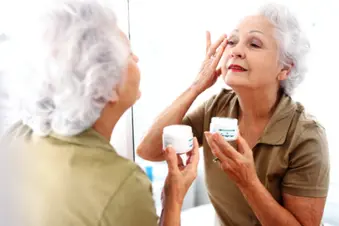
Having psoriasis won’t make your skin age faster. But you’ll have to change the way you manage this skin condition as you get older.
Talk to Your Doctor About Your Treatment Plan
If you’re 65 or older, you may need to adjust the types of medications you use. Some issues to consider:
Topical treatments can cause new side effects as you get older. Though topical psoriasis treatments like corticosteroids and topical vitamin D are usually considered safe for older adults, they may cause new issues. Tell your doctor if you notice purple spots on your skin, if your skin looks transparent, or if you notice signs of infection such as redness or areas that are inflamed or warm to the touch.
Topicals may be harder to apply as you age. You should also let your doctor know if you have joint swelling or flexibility issues that make it hard to apply topical medications to your psoriasis plaques.
Some oral or injected medications may be harder for your body to process. Your kidneys don’t work as well as you age. That means they remove less waste from your body. Because of that, medications that work throughout your body, like methotrexate, can build up in your system and cause problems. If you’re taking these medications, your doctor will need to monitor you closely. They may recommend another treatment or ask you to work with a kidney specialist to make sure you’re staying safe.
You may need to stop using biologics. Biologics are genetically engineered proteins that change the way your immune system works. Experts recommend that people over 65 use biologics only if all other treatments don’t work. That’s because biologics can cause kidney problems and increase your risk of infection.
Other medications may cause flare-ups. Medications you take for other conditions may cause psoriasis symptoms, especially in older adults. These drugs include beta-blockers, ACE inhibitors, and nonsteroidal anti-inflammatory drugs (NSAIDs). If you use any of these medications, talk to your doctor about it. You’ll need to monitor your psoriasis flares and, if needed, try a different type of medication.
Be Aware of Other Health Conditions
Having psoriasis boosts your risk of many other age-related conditions. Watch for symptoms of common age-related health problems linked to psoriasis, including:
- Bone loss, which can lead to conditions like osteopenia and osteoporosis
- Type 2 diabetes
- Heart disease and conditions that contribute to it, such as high blood pressure and high levels of “bad” LDL cholesterol
- Metabolic syndrome, a group of medical problems that includes heart disease, high blood pressure, and excess weight in your stomach area
- Obesity
- Psoriatic arthritis. An estimated 30% of people with psoriasis get psoriatic arthritis. That’s a condition that causes stiff and swollen joints, and other issues like fatigue.
Many of the lifestyle changes that can help you age healthfully and manage your psoriasis will also reduce your risk of conditions linked to psoriasis. Eat a healthy diet filled with fruits and vegetables, whole grains, and healthy fat sources. Exercise regularly, and if you need to lose weight, talk to your doctor about a plan for slimming down.
If you have another health condition, make sure you stick to your treatment plan. Get regular checkups for your psoriasis, too. Controlling your psoriasis through treatment can make you less likely to get related health conditions.
Take Extra Care with Anti-Aging Products and Treatments
Because you have psoriasis, you know to be cautious about which products you use on your scalp and skin. Be especially cautious about products labeled “anti-aging,” as they can contain irritating ingredients. It may also help to:
Choose alcohol-free products. Alcohol can irritate and dry out your skin, and may contribute to psoriasis plaques.
Pick lotions with ceramides, lipids, and hyaluronic acid. Your body makes less of these natural moisturizing agents as you get older. Adding them back with a lotion or cream can soften your skin and decrease the appearance of psoriasis scaling.
Use retinoids sparingly. Retinoids are types of vitamin A-derived compounds that are sometimes referred to as “Retin-A.” They’re common in anti-wrinkle and anti-aging topical lotions and creams, because they lessen the appearance of wrinkles and help with brown spots. But they can irritate your skin, so don’t use them on active psoriasis plaques or during a flare-up.
Skip chemical peels, dermabrasions, and laser procedures if you’re having a flare-up. They can make irritation even worse.
Take extra care when dyeing your hair. Don’t shampoo your hair for at least 1 day before you dye it. Your natural oils can protect your scalp from harsh dyes, helping reduce irritation that could contribute to psoriasis. If you have psoriasis on your scalp, consider highlights or lowlights instead of all-over dye. They can be applied with foil, which can keep the dye from touching your scalp.
Show Sources
(Photo Credit: WebMD)
SOURCES:
Acta Dermato-Venereologica: “Use of Aspirin, Nonsteroidal Anti-inflammatory Drugs, and Acetaminophen (Paracetamol), and Risk of Psoriasis and Psoriatic Arthritis: A Cohort Study.”
Dermatology: “Managing Psoriasis in the Elderly.”
International Journal of Dermatology: “Clinical study of psoriasis occurring over the age of 60 years: is elderly-onset psoriasis a distinct subtype?”
American Academy of Dermatology Association: “How to Treat Psoriasis at Age 65 and Beyond.”
Arthritis Today: “Biologics.”
Shari Lipner, MD, PhD, dermatologist, Weill Cornell Medicine and New York-Presbyterian Hospital, New York City.
Indian Journal of Dermatology, Venereology and Leprology: “Linking of psoriasis with osteopenia and osteoporosis: A cross-sectional study.”
National Psoriasis Foundation: "Health Conditions Linked to Psoriasis.”